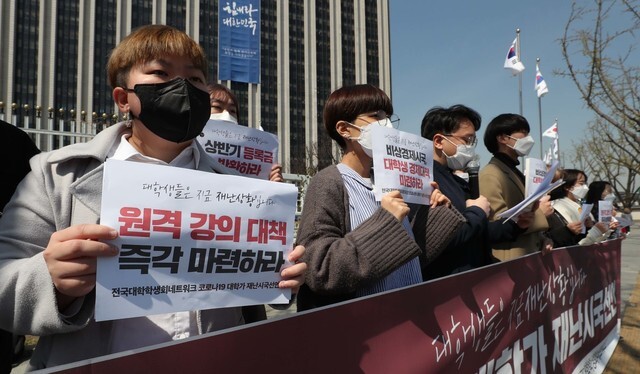hankyoreh
Links to other country sites 다른 나라 사이트 링크
[Editorial] Universities should heed students’ calls for tuition reimbursement

Concerns for universities have been intensifying as the novel coronavirus outbreak drags on. More and more are announcing that they plan to conduct lectures exclusively online for the entire spring semester. Students have begun campaigning for tuition refunds, complaining of the poor quality of online lectures and a lack of alternative approaches for practical training and experimentation-oriented classes that cannot be substituted with online content.
From the time classes began in March, the online classes have been in a state of major confusion, with some classes suspended as a lack of preparation led to server failures at some universities. Yet all the blame has been placed on the professors, lecturers, and students for their lack of familiarity with online lectures. Many professors and lecturers have been working overtime to acquire their own equipment to prepare recorded lectures or provide lectures in real time. But in some cases, students have been let down by halfhearted lectures and outrageous behaviors taking place during instruction. Routinely, instructors have been either simply posting old lecture material or substituting classes with assignments; some professors have stirred up controversy by smoking or downloading pornographic videos during lectures.
In a survey of 6,621 students by the National University Student Council Network, just 6.8% of respondents said they were satisfied with the remote learning programs during the coronavirus outbreak. Students have been unable to use libraries, laboratories, or studios or benefit from real hands-on experience. It is hardly unreasonable for them to be demanding their tuition back.
Yet the Ministry of Education and universities have been dismissing the calls for reimbursement as both a violation of the universities’ autonomy and contrary to regulations concerning refunds. The large costs of preparing online lectures have also been cited as a reason. To be sure, the universities should not be held responsible for having to conduct online lectures in the first place, since they were an unavoidable response to the coronavirus situation. But neither is it right for them to wash their hands of the damages suffered by students as a result of low-quality lectures.
At a time when many households have been suffering an economic blow as a result of the virus, the Ministry of Education and universities should be heeding the students’ calls to have their tuition reimbursed. This would also help to reduce the burden on the students’ parents. In that sense, they might consider the example set by universities in the Daegu area, which have been returning a portion of tuition to all students in the form of special scholarship funds.
Beyond these calls for the reimbursement of tuition, the coronavirus crisis is raising significant questions about the role of a university in the 21st century. If online lectures are substituting for many of the university’s services, then it’s time for us to consider what other forms of instruction it can provide and what role of community learning it can fulfill.
Please direct comments or questions to [english@hani.co.kr]

Editorial・opinion
![[Column] Season 2 of special prosecutor probe may be coming to Korea soon [Column] Season 2 of special prosecutor probe may be coming to Korea soon](https://flexible.img.hani.co.kr/flexible/normal/500/300/imgdb/original/2024/0426/3317141030699447.jpg) [Column] Season 2 of special prosecutor probe may be coming to Korea soon
[Column] Season 2 of special prosecutor probe may be coming to Korea soon![[Column] Park Geun-hye déjà vu in Yoon Suk-yeol [Column] Park Geun-hye déjà vu in Yoon Suk-yeol](https://flexible.img.hani.co.kr/flexible/normal/500/300/imgdb/original/2024/0424/651713945113788.jpg) [Column] Park Geun-hye déjà vu in Yoon Suk-yeol
[Column] Park Geun-hye déjà vu in Yoon Suk-yeol- [Editorial] New weight of N. Korea’s nuclear threats makes dialogue all the more urgent
- [Guest essay] The real reason Korea’s new right wants to dub Rhee a founding father
- [Column] ‘Choson’: Is it time we start referring to N. Korea in its own terms?
- [Editorial] Japan’s rewriting of history with Korea has gone too far
- [Column] The president’s questionable capacity for dialogue
- [Column] Are chaebol firms just pizza pies for families to divvy up as they please?
- [Column] Has Korea, too, crossed the Rubicon on China?
- [Correspondent’s column] In Japan’s alliance with US, echoes of its past alliances with UK
Most viewed articles
- 1After election rout, Yoon’s left with 3 choices for dealing with the opposition
- 2AI is catching up with humans at a ‘shocking’ rate
- 3Noting shared ‘values,’ Korea hints at passport-free travel with Japan
- 4Two factors that’ll decide if Korea’s economy keeps on its upward trend
- 5Why Kim Jong-un is scrapping the term ‘Day of the Sun’ and toning down fanfare for predecessors
- 6South Korea officially an aged society just 17 years after becoming aging society
- 7Korea’s 1.3% growth in Q1 signals ‘textbook’ return to growth, says government
- 8Is Japan about to snatch control of Line messenger from Korea’s Naver?
- 91 in 5 unwed Korean women want child-free life, study shows
- 10[Reportage] On US campuses, student risk arrest as they call for divestment from Israel